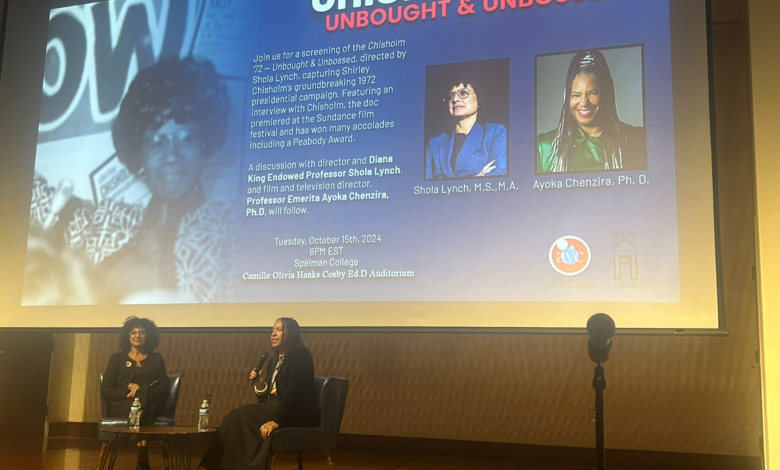Spelman College honors Shirley Chisholm’s legacy

On Tuesday, Oct. 15, Spelman College hosted a screening of Chisholm ’72: Unbought & Unbossed, a documentary chronicling Shirley Chisholm’s 1972 campaign as the first Black woman to run for president of the United States. The screening took place on campus in the Camille Olivia Hanks Cosby Ed.D. Auditorium.
This screening aligns with the 2024 presidential election, which currently features Kamala Harris, the first female and African American Vice President, and the current Democratic presidential nominee.
“Looking for a road to freedom, take the Chisholm trail.” Jesse Jackson’s Operation PUSH Choir sang these lyrics during Shirley Chisholm’s history-making run for President of the United States. The phrase “Chisholm Trail” is a clever play on words, connecting Shirley Chisholm’s name with the historic cattle-driving route used in the post-Civil War era. Just as that trail symbolized progress and opportunity, Chisholm’s presidential run carved a new path in the post-Civil Rights era, inspiring generations to pursue political freedom and representation, a message particularly relevant as the 2024 election approaches.
The documentary opened with a rap ad from the “Rock the Vote” campaign, which aimed to encourage youth involvement in politics. From there, it moved to Chisholm’s 1972 announcement of her candidacy for president, setting the tone for the film’s exploration of her groundbreaking campaign. Chisholm was not only the first Black woman to run for the highest office in the nation, but she also broke new ground as an African American in U.S. politics.
The film, which runs 1 hour and 17 minutes, provides a rich look at Chisholm’s life, including her family’s move from Barbados to New York and her rise in political advocacy. It also features testimonials from key figures in her life, such as Victor L. Robles, her ex-husband Conrad Chisholm, Octavia Butler, Reverend Walter Fauntroy, and Bobby Seale.
Following the screening, a panel discussion was held featuring the film’s director, Shola Lynch. Lynch made her directorial debut with this documentary in 2004 and is now the Diana King Endowed Professor at Spelman College. Dr. Ayoka Chenzira, Professor Emerita of Art and Visual Culture at Spelman, joined her. The two engaged in a thoughtful conversation about Chisholm’s legacy and her candidacy’s impact on future generations of women and people of color in politics.
“If I couldn’t see her, how would the rest of the world see her?” Lynch recalled the lack of media coverage around Chisholm’s run. “The news didn’t cover her run for president because nobody thought she would win.” Lynch also spoke about the research process behind the documentary. “It’s not a documentary if you don’t do research,” she said, remarking on the importance of digging into archives, especially for Black history, which is often under-documented. “Even in the film, the best footage was taken by two students who talked Chisholm into letting them follow her around.”
The discussion was opened up to audience questions, allowing attendees to reflect on their personal connections to Chisholm’s legacy and how her story resonates today. During the Q&A session, Lynch reflected on how history is much like a relay race, with each generation building on the last. “We wouldn’t be here today if it weren’t for Shirley Chisholm, and I wish she was around to see it,” Lynch said. She noted that Chisholm was not the only trailblazer, mentioning others like Jesse Jackson and Barack Obama, whose campaigns furthered the legacy Chisholm helped create.
Lynch also challenged the audience to think about their activism. “If you’re a political person, if you’re an activist, if you believe in justice, how is that part of your daily life?” Lynch asked, urging everyone to reflect on how they can honor the work of leaders like Chisholm by actively participating in shaping the future of political freedom and representation.
Chisholm stated in the documentary, “I want to be remembered as a woman who fought for change in the 20th century.” Her legacy, evident in the 2024 election and beyond, knowingly or unknowingly continues to inspire and encourage a new generation of political activists and leaders.



